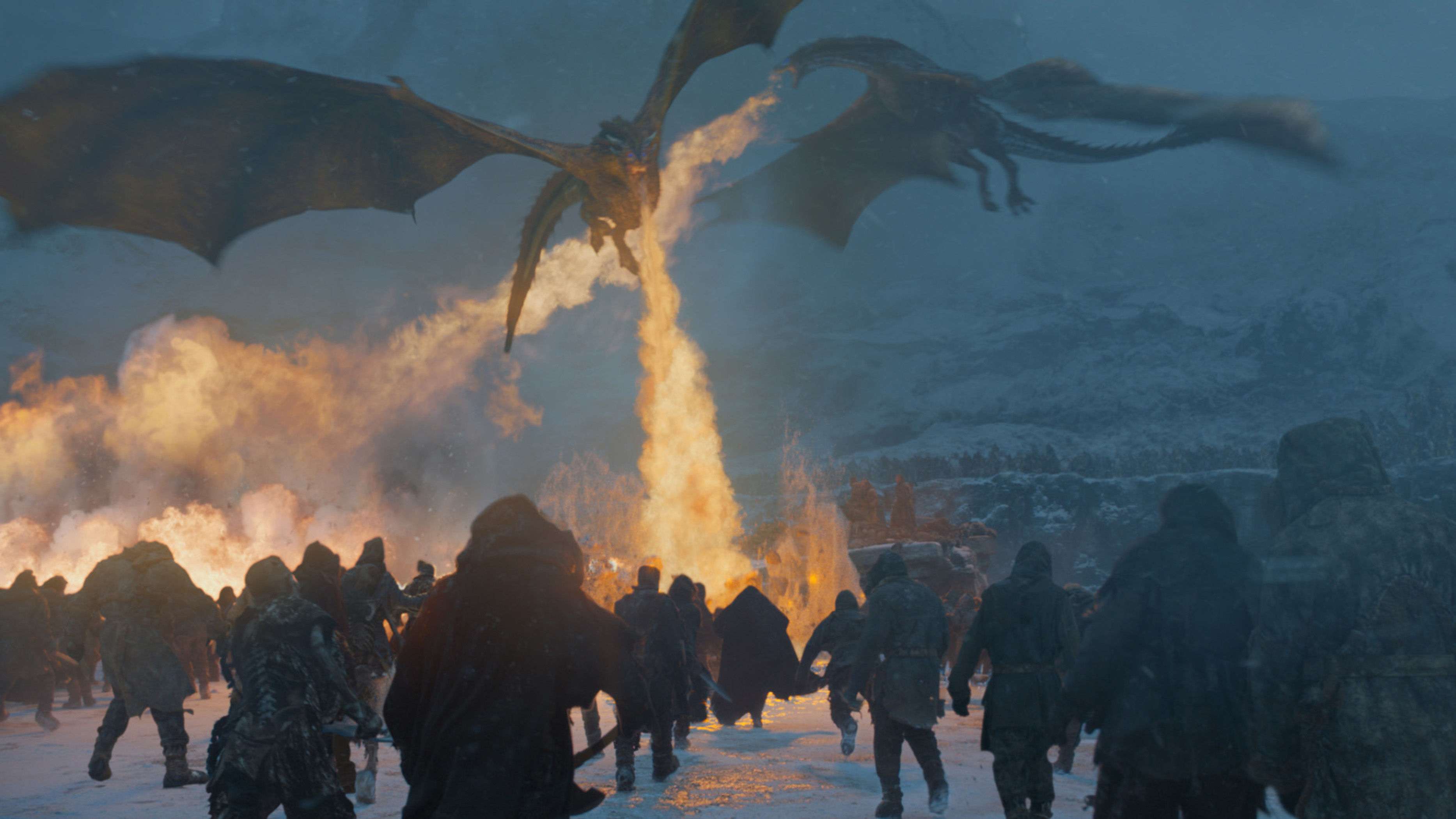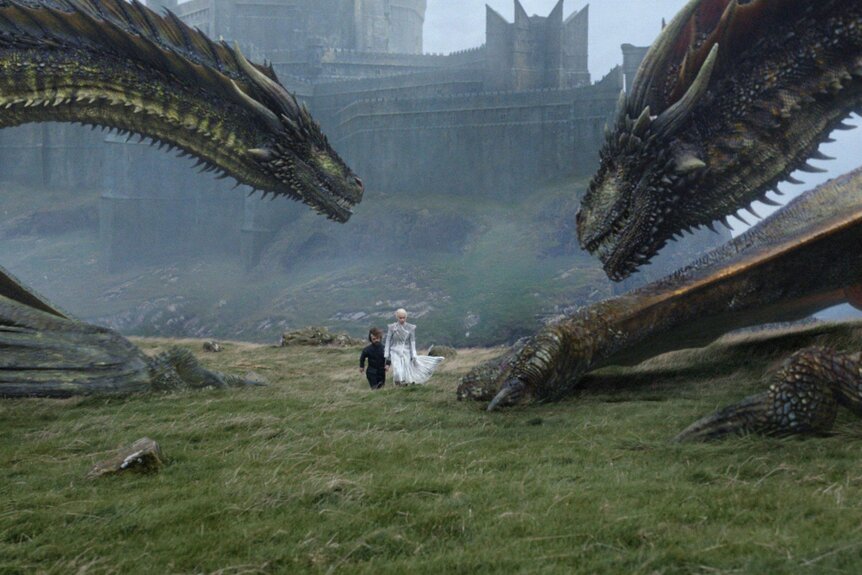Create a free profile to get unlimited access to exclusive videos, sweepstakes, and more!
The shocking death of a dragon helped shape the end of Game of Thrones

As we count down to the Game of Thrones series finale, we're looking back at the most pivotal moments of the show's first seven seasons.
Game of Thrones has always been a show full of shocking deaths. The series made its bones on one when it managed to restage Ned’s Death in Season 1, using TV norms and casting practices to help fool the viewer so they wouldn’t see it coming. The show followed it up with other shock deaths over the years, from the Red Wedding to Jon’s demise at Castle Black to Hodor’s sacrifice that warped his mind as Bran warged into him through time.
The later season deaths were shocking for everyone, even well-read fans, because there were no books to guide them. The biggest came in the penultimate episode of Season 7 when Viserion perished at the hands of the Night King. It was the moment Daenerys stopped being infallible as the magical, unstoppable force which would unite Westeros.
Dragons are not the only magical creatures in Westeros, but they were the ones into which the show sunk its budget. Fans have decried the lack of direwolves on screen, but what always seemed the most unfair was how much more expendable they were. Though the death of Lady, Sansa’s wolf, was directly taken from the novels, as was the murder of Grey Wind as part of the Red Wedding, the show seemed almost too eager in the later seasons to write off the Stark pets. By Season 7, most “death pools” were regularly adding the last living direwolves as characters to be killed off. But no one ever thought to put a dragon on the list, partly because the show focused on them so heavily.
This is not to say the dragons aren’t also outsized characters in the A Song of Ice & Fire novels. These are deeply magical creatures in Martin's books, whose birth does not just connect them to Daenerys, but has a ripple-like effect across the world. The birth of the dragons, the first in the world in hundreds of years, strengthens — and in some places reawakens — magic. Both Melisandre and Thoros of Myr state at various points that their spells started working differently and better after the coming of the red comet which heralds the birth of Daenerys’ children. There’s a reason when Tyrion arrives in Essos that he sees a red priestess preaching the word of Daenerys. Those who worship the Red God feel a connection between dragons coming back into the world and their abilities.
Whereas the Starks’ animals are personalized connections, the dragons’ effect upon the world makes them seem more profound, as do the circumstances under which they were born. The books hint that while Targaryens have been trying for decades to accomplish the rebirth of dragons, Daenerys is the first to manage it. Her status as the Mother of Dragons, who walked into the fire and walked out again Unburnt, is the stuff of legends. As Tyrion dryly observes to Varys this season, walking through fire and coming out the other side with dragon whelps will give one the idea they are destined for greatness.
Moreover, the history of Westeros, as retold through the novels, suggests she would be the one to come in and "break the wheel." It’s already been done once. Aegon I Targaryen, known as Aegon the Conqueror, arrived on Westeros with three full-grown dragons and proceeded to defeat all comers and unite the Seven Kingdoms. Daenerys would most likely do the same upon her arrival, right?
It’s this kind of assumption and misdirection that author George R.R. Martin loves to pull, both on the readers and the characters. Daenerys reads the history of the Seven Kingdoms, learns how Aegon conquered, looks at her own little dragons, and figures two plus two will equal four, just as soon as her dragons are full grown. The reader, having no reason to question this logic, therefore assumes it too. So does everyone who meets her. As Season 8 begins, Jon successfully argues that Daenerys's dragons make her valuable addition to the North's army.
But it’s all wrong. Dragons may be magic, but they're not a deus ex machina. Like all magic in Westeros, they're just tools, no different than an army of Unsullied or a horde of Dothraki, to be used wisely on the battlefield and well during times of peace. Despite everyone’s assumptions, Daenerys never mastered either of those things, in the books or on the show. She locks two of her dragons up during peacetime, and the third runs away, the exact mistake her forefathers made. Her victories on the battlefield against the Masters (and later against the Lannisters) aren’t tactical victories so much as they were strokes of luck, due to being underestimated by men.
Viserion’s death happens because Daenerys comes up against the first man who doesn’t underestimate her or emotionally reacts in horror by her instant brutality and surrenders. Her dragons aren’t flying tactically, they’re just hanging out in the middle of the clear sky, easy targets because no one involved on the side of the living has ever considered worrying about a well-thrown spear or an oversized crossbow. Moreover, that happens despite the fact Daenerys already faced the latter on the battlefield, where Drogon was hit. It’s just that Bronn’s aim wasn’t fatal. The Night King’s was.
Viserion's death was a shock to the system, the one death viewers never considered possible. But it was also a lesson, and an important one, which Daenerys refused to heed. The Night King's murder of Daenerys' child was the herald that taking back Westeros wasn't going to be the cakewalk she'd assumed for all these years, and the first sign she was far more vulnerable in this war than anyone had previously thought.



























